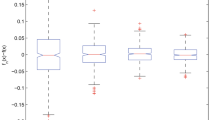Abstract
In this chapter, we consider some extensions of the Central Limit Theorem to classes of sums (or averages) of dependent random variables. Many further extensions are possible, but we focus on ones that will be useful in the sequel. Section 12.2 considers sampling without replacement from a finite population. As an application, the potential outcomes framework is introduced in order to study treatment effects. The class of U-statistics is studied in Section 12.3, with applications to the classical one-sample signed-rank statistic and the two-sample Wilcoxon rank-sum statistic.
Access this chapter
Tax calculation will be finalised at checkout
Purchases are for personal use only
Similar content being viewed by others
Notes
- 1.
Alternatively, the celebrated Kolmogorov Three-Series Theorem may be used to easily show that the series (12.51) converges with probability one; see Billingsley (1995), Theorem 22.8. In addition, if \(Var ( \epsilon _j ) < \infty \), we may write, \(X_j = \lim _{m \rightarrow \infty } X_{m,j}\), where \(X_{m,j} = \sum _{i=0}^{m-1} \rho ^i \epsilon _{j-i}\), and the limit can be interpreted in the mean-squared sense; see Problem 11.65.
- 2.
The arithmetic-geometric mean inequality says that, for \(y_i \ge 0\), \((y_1 + \cdots + y_k )/k \ge (y_1 \cdots y_k)^{1/k}\).
Author information
Authors and Affiliations
Corresponding author
Rights and permissions
Copyright information
© 2022 The Author(s), under exclusive license to Springer Nature Switzerland AG
About this chapter
Cite this chapter
Lehmann, E.L., Romano, J.P. (2022). Extensions of the CLT to Sums of Dependent Random Variables. In: Testing Statistical Hypotheses. Springer Texts in Statistics. Springer, Cham. https://doi.org/10.1007/978-3-030-70578-7_12
Download citation
DOI: https://doi.org/10.1007/978-3-030-70578-7_12
Published:
Publisher Name: Springer, Cham
Print ISBN: 978-3-030-70577-0
Online ISBN: 978-3-030-70578-7
eBook Packages: Mathematics and StatisticsMathematics and Statistics (R0)




